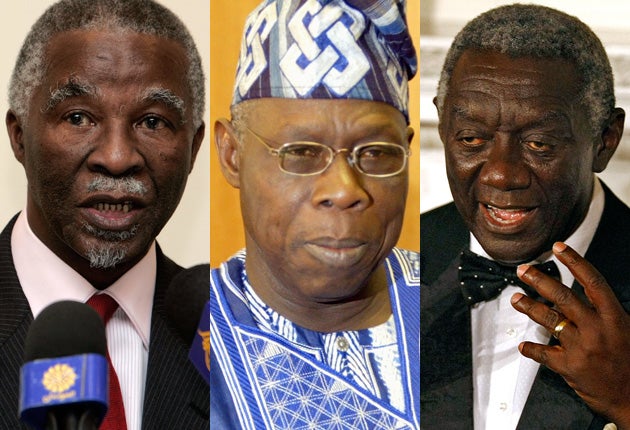World Focus, Africa: And the winner is ... er, we couldn't find one

Your support helps us to tell the story
From reproductive rights to climate change to Big Tech, The Independent is on the ground when the story is developing. Whether it's investigating the financials of Elon Musk's pro-Trump PAC or producing our latest documentary, 'The A Word', which shines a light on the American women fighting for reproductive rights, we know how important it is to parse out the facts from the messaging.
At such a critical moment in US history, we need reporters on the ground. Your donation allows us to keep sending journalists to speak to both sides of the story.
The Independent is trusted by Americans across the entire political spectrum. And unlike many other quality news outlets, we choose not to lock Americans out of our reporting and analysis with paywalls. We believe quality journalism should be available to everyone, paid for by those who can afford it.
Your support makes all the difference.The decision to withhold Africa's biggest leadership prize in only its third year has prompted discussion of the failings of two heavyweights: South Africa's Thabo Mbeki and Nigeria's Olusegun Obasanjo. The announcement that there would be no Mo Ibrahim laureate this year will, however, have surprised the less well known John Kufuor of Ghana more than his higher-profile counterparts.
The award for "achievement in African leadership", which offers a golden handshake of $5m and a substantial pension to those who attained office democratically and stood down within the last three years, would appear to be designed with Mr Kufuor in mind. He stepped aside this year in the west African nation's second democratic transition, and Ghana was chosen by Barack Obama for his first speech in Africa as US President.
The decision not to do the obvious has instead done much to fulfil the Mo Ibrahim foundation's stated aim of stimulating debate about good governance in Africa. The inaugural award to Mozambique's Joaquim Chissano and last year's prize to Botswana's Festus Mogae also sparked arguments about their legacies, and a similar squabble over the mediocre record of Mr Kufuor would have followed on this occasion.
Now attention has been focused on a discouraging year for democracy in Africa, marked by coups, inheritance battles and dysfunctional power-sharing administrations born of rigged elections. In diplomatic language the foundation said as much yesterday, noting "the progress made with governance in some African countries, while noting with concern recent setbacks in other countries".
The Sudan-born telecoms tycoon pointed out that he had never envisaged making the award every year. Raising the bar for the financial prize may make the award more relevant, and next year's committee will be watched more keenly after yesterday's surprise.
Both Mr Mbeki and Mr Obasanjo are attempting the transition from flawed national leaders into African statesmen as mediators in the continent's conflicts. But given their records while heads of state, awarding the Ibrahim prize to either of them would have undermined its credibility.
Mr Mbeki had to be pushed by his own party to leave office last year after a power struggle with his successor, Jacob Zuma. He left South African politics tarnished, and his performance as mediator on Zimbabwe looks worse with each new crisis in the unity government in Harare.
Mr Obasanjo, a former military ruler in his first stint in power, would be an even odder choice. His civilian presidency was marked by corruption and staggering inequality in Nigeria, and as his days drew to a close, his allies tried – unsuccessfully – to amend the constitution to allow him to stand for a third term.
As for Mr Kufuor, it could be argued that he has already been lavishly rewarded. His retirement package included a reported cash lump sum of $400,000, two residences, a fleet of six vehicles, a monthly stipend, travel allowances and seed capital of $1m for the creation of a foundation. While Mr Ibrahim dismissed speculation that the award had been withheld as his own finances have been hit by the global recession, it's not hard to imagine that his money might be employed more usefully than in further softening the feather bed retirement of Mr Kufuor.
Rejected for Africa's Nobel: Nigeria, South Africa and Ghana
Olusegun Obasanjo presided over eight tumultuous years of democracy in Nigeria. But corruption was rife and many remained desperately poor despite the nation's oil wealth. His allies tried to change the constitution to let him stand for a third term.
Thabo Mbeki was forced to step down last year after losing the race for the ANC leadership. He was criticised for failing to hold Zimbabwe's Robert Mugabe to account and also for questioning the link between HIV and Aids as 300,000 South Africans were dying.
John Kufuor stepped aside without a fuss after two terms, marking Ghana's second successful handover, a milestone not just for the country but for Africa as whole. However, the opposition at the time accused his administration of corruption.
Join our commenting forum
Join thought-provoking conversations, follow other Independent readers and see their replies
Comments